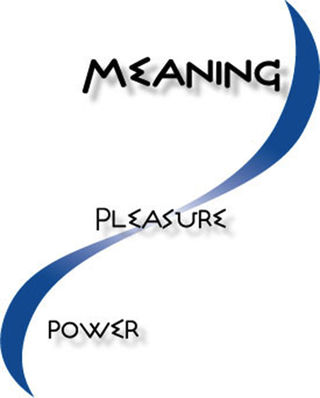
On my travels around the world, I’ve encountered many people who told me that they felt something was missing in their lives and that they felt overwhelmed, lonely, and unfulfilled. A pessimistic air seems to have engulfed our world, with increased levels of stress due to unemployment or job insecurity, financial hardship, health and relationship issues, and geopolitical instability. Today, we see that despite being in an increasingly networked and connected world via technology, too many people feel disconnected from and untrusting of others—neighbors, co-workers, leaders—and, perhaps most importantly, from themselves.
Unsure of where to turn for solutions, many seek to “escape” through addictions—television, sex, food, alcohol, drugs, shopping, gambling, the Internet, etc. Left unchecked, these pursuits comprise a vicious, downward cycle and manifest themselves as an endless and joyless undertaking, much like the one experienced by the Greek hero Sisyphus, who was ordered by the gods to push a big rock uphill, only to see it slip out of his hands in the very last moment and roll down the hill once more.
Pursuit of Happiness
Some say that the solution to these issues is to seek happiness. “Just find something that will make you happy” is advice I hear often. But what does this really mean? Does it mean a person should find something to make them happy in the moment, perhaps distracting themselves from the reality of their life? Although this approach might provide temporary reprieve, I believe that life is not about the pursuit of happiness. Happiness, moreover, is not the ultimate goal of life. Happiness is an emotion that is linked to pleasure but it is fleeting; it doesn’t last. We can share a happy moment when we are enjoying a good meal or a good laugh with a friend but this emotion only lasts a short time. Thinking happiness will relieve us from our anxiety and stress is misguided. What happens when life throws us a curveball, when things don’t go well, when we face suffering, illness, or death? What happens when our ability to make sense of life is challenged? The pursuit of happiness will not necessarily help us in these difficult times, nor will it bring us the deep sense of fulfillment we are all looking for in life.
Pursuit of Power
Some believe the solution is to seek power over our lives and the lives of others. Power is about being strong and dominant, having (or trying to have) control or influence over others, other events, or other things in our environment. Ultimately, though, the pursuit of power leads to emptiness because power over others, and even over most of our personal circumstances, is actually an illusion. Power is an exhausting game to play and, like pleasure, it is fleeting and always subject to unforeseen forces. In this connection, the search for power also becomes an endless and joyless undertaking.
The search for power in our lives is parallel to our search for happiness and pleasure. For the most part, it too is “out there.” Power over our employees, our bosses, our customers, our shareholders, our kids, the waitress in a restaurant, or a clerk in a retail store is illusory at best and terribly destructive at worst. We think we might have power, but we never know for sure. Even if we do, in the power game there’s always an opponent; the ground is always shifting. Just ask the parents of teenagers who, even with the best of intentions, find that parental guidance is much easier said than done! Indeed, with parenting comes the realization that the search for “power” over children is an exhausting, ever-shifting game!
Money
The pursuit of power through monetary wealth is also an illusion, one that often leads to unintended consequences. We have all heard people express the idea that more wealth will bring them meaning and fulfillment: “If only I had more money.” “If only I had a bigger house.” “If only I had a first class ticket.” We’ve been conditioned to believe that these are authentic symbols of success—the more the better. Having money and material things has become the end goal for many people because they can count it, keep score, and use it to compare themselves to others. Living the “good life” seems to be just one thing away. But when we don’t look the way we think we should or if we don’t have the same (or greater) amount of wealth or abundance of things as others do, we trap ourselves into thinking that it is we who are not enough. In other words, we become “prisoners of our thoughts.” Unfortunately, such feelings of inadequacy and the relentless pursuit of trying to overcome them typically lead to increased stress, i.e., distress or what is normally associated with the negative and unhealthy side of stress, and even depression.
The costs, whether intended or unintended, obvious or hidden, of the hunt for more power and money, which effectively is a primitive form of the search for power, are staggering. We postpone finding and experiencing deep meaning in our lives when we are so busy seeking and trying to get “more.” We ignore our relationships while we focus on accumulating more. We overlook our health in our chase for more. Interestingly, the results of many research studies have shown that once we achieve a certain level of wealth, enough to cover the basics of life, any increase in new wealth does not necessarily result in a lot more satisfaction, especially lasting satisfaction. In other words, doubling our money won’t bring about a doubling of meaning in our lives.
It’s not about happiness or power. It’s about meaning.
Psychiatrist and existential philosopher Viktor E. Frankl, M.D., Ph.D., author of the classic Man’s Search for Meaning, wisely espoused that the primary intrinsic motivation of human beings is the search for meaning. Meaning, in this regard, is the energy or fuel that motivates us to achieve our full potential as human beings, in our personal and working lives, both in good times and in not-so-good times. As a motivational force, the will to meaning is not external but is intrinsic to our very being—a part of our “soul’s code,” if you will—which distinguishes it from other human drives, such as those based primarily on pleasure or power.

Moreover, Frankl was convinced that, in the final analysis, “there is no situation that does not contain with it the seed of a meaning.” In other words, meaning can be found everywhere, in and through all of life’s experiences, more like energy than matter. In this sense, it cannot be created or destroyed, only transformed. It exists in the moment—in all moments—and is waiting to be discovered. Our instinct for meaning, in our everyday lives and in our work, is ours right now, at this very moment—as long as we are not prisoners of our thoughts.


